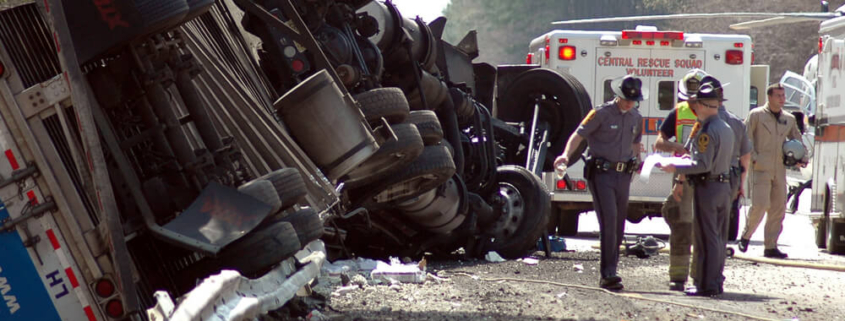How to Avoid an Accident with a Big Rig
Each year, thousands of individuals are killed and tens of thousands are seriously injured in large truck accidents. Big rig accidents are especially dangerous because fully-loaded tractor-trailers typically weigh 20 to 30 times more than an average passenger vehicle. And according to data from the Insurance Institute for Highway Safety (IIHS), occupants of passenger vehicles are at greater risk of serious injuries and fatalities from these types of incidents.
For example, in 2017, the IIHS found that 17% of those killed in truck accidents are occupants of the truck, while 68% are occupants of cars and other passenger vehicles. Another 14% of those killed are motorcyclists, bicyclists, and pedestrians. The data also found that the number of individuals killed in large trucking accidents was 30% higher in 2017 than in 2009.
With big rig accidents on the rise, it is more important than ever for those who share the road with large trucks to be extra cautious to help ensure they stay safe. Here are five essential steps to take to avoid an accident with an 18-wheeler:
Keep a Safe Distance
Large commercial trucks need a lot of room to maneuver, and it is never a good idea to follow them too closely. Fully-loaded trucks require 20% to 40% more braking distance than an average passenger vehicle when they need to stop, for example. And this discrepancy is greater when there are adverse driving conditions, such as wet and slippery roads. By getting too close to them, drivers of passenger vehicles are susceptible to numerous potential hazards, such as:
- Sudden slowdowns and stops;
- Tire blowouts;
- Vehicles being struck by objects or debris falling out of the truck;
- Trucks falling to their side or rolling over because of heavy winds or other factors.
Under normal driving conditions, you should give trucks at least one car length of space. When you encounter inclement weather, allow even more distance between you and the truck.
Give Trucks Plenty of Space to Turn
Along the same lines as the first point, big rigs require a lot of space to complete a turn. If you are too close to a truck when it is turning, there is a risk that you may be trapped inside the truck’s turning radius, which could cause a collision. For this reason, make sure to be extra cautious at intersections and give trucks an adequate amount of room to make their turn.
Stay Out of Blind Spots
All vehicles have blind spots, but tractor-trailers have more blind spots than the average passenger vehicle. 18-wheelers have four large blind spots, two on each side of the vehicle. These are commonly referred to as “no-zones”. If you are in one of these no-zones while a truck is changing lanes or making a turn, you are at greater risk of a collision. Stay out of these blind spots as much as possible, and only enter them when it is absolutely necessary, such as when you are passing a truck.
Pass and Merge with Trucks Carefully
Be very cautious when you are passing up a truck or merging into traffic with a truck alongside your vehicle. Keep in mind that it takes much longer to pass an 18-wheeler, and you will need plenty of space in front of you to complete this action safely. Be especially careful if you are trying to pass a big rig going uphill or downhill, and always pass on the left side, because a truck’s largest blind spot is on the right side of the vehicle.
Avoid Distractions
Texting while driving and similar activities are especially dangerous because they distract drivers in three ways; manually, visually, and cognitively. This is why the increased use of smartphones while behind the wheel is quickly becoming one of the leading causes of all types of motor vehicle accidents. Avoid distracted driving at all times, and particularly when you are driving near a large commercial truck.
Injured in a Truck Accident in Georgia? Speak with a Skilled Personal Injury Lawyer
There are times when you follow all the best safety practices and still end up in a trucking accident. These accidents can occur for a number of reasons, such as driver negligence, trucks that are poorly maintained, overloaded or unevenly loaded trucks, defective vehicle parts, and other factors. If you or someone close to you was injured or killed in a trucking accident, you may have the right to compensation.
At Bailey, Javins, and Carter L.C., we have successfully represented numerous clients who have been injured in an accident with a big rig. We have an in-depth understanding of the complexities involved with these types of cases, and we put our extensive experience to work to help ensure that our clients receive full and fair compensation for their injuries.
Call our Atlanta office today at 678-981-5370 or send us a message through our web contact form.

 How to Avoid an Accident with a Big Rig
How to Avoid an Accident with a Big Rig

